Anthony's Military Books
GALLIPOLI
At the end of 1998 Anthony left Government House to become a full-time writer. His new book Soldier Boy was inspired by a visit he made to Gallipoli in 1995 with Governor-General Bill Hayden for the 80th anniversary of the Anzac landings.
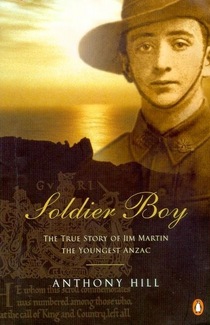
Struck by the number of young people present, Anthony looked for a story that would speak to them about the Gallipoli campaign and the nature of war.
Two years later he heard about 14-year-old Jim Martin, who told the great lie and said he was 18 ... went to Gallipoli ... and lived for only seven weeks before dying of disease. He is the youngest Australian Anzac and almost certainly the houngest Australian soldier to die in war.
Anthony put Jim in the Governor-General's speech, stood up at his desk and said loudly "There's a book in you."
Anthony drew on the resources of the Australian War Memorial, the National Archives and interviews with members of Jim's family to write his book, which has gone on to be the most successful of all his works, selling over 100,000 copies to date (2025).
Soldier Boy won the Ethel Turner Prize for young adults in the 2002 NSW Premier's Literary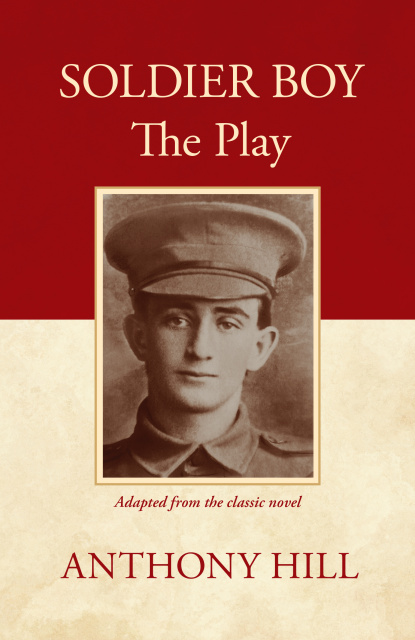 Awards and was a CBCA Honour Book. It continues to be widely read not only in schools but across all ages. Awards and was a CBCA Honour Book. It continues to be widely read not only in schools but across all ages.
Anthony has recently dramatised the novel and it has been put on 2025 VCE Drama Playlist. Soldier Boy the play will have its professional premiere at Theatre Works, St Kilda, Melbourne in June 2025.
This book is a model of historical writing for young (and old) readers ... a significant contribution to the nation's culture... (NSW Judge's report).
THE WESTERN FRONT
Anthony was already working on his next military book, Young Digger, even before Soldier Boy had been published. A friend at the AWM pushed an envelope of faded newspaper clippings across the lunch table and said, 'Here's your next book, Tony.'
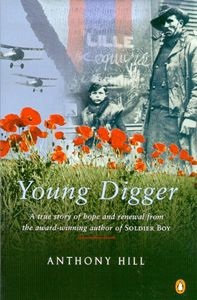
Indeed it was! Reading the poignant stories of Henri, the little French war orphan who was adopted as a mascot by some Australian airmen, nicknamed 'Young Digger' and smuggled back home in a sack at the end of the Great War, Anthony realised it was the ideal companion book to Soldier Boy:
Gallipoli and the Western Front. Anzac and the Armistice. Leaving, and coming home. Death, and finding love amid the ashes of war. The stories of these two boys stand like bookends to the history of Australia's involvment in the First World War.
Published in 2002, Young Digger was short-listed for the NSW Premier's History Awards and was another CBCA Notable Book for that year.
A new edition was published in 2016 for the general readership. At the present time (2025) Anthony is working on a dramatisation of Young Digger, as a companion play to Soldier Boy.
The book was written with the close co-operation and support of the Tovell family – as Soldier Boy was written with the continuing assistance of the Martin family. I deeply appreciate them all.
WAR DOGS
Anthony's third military book, Animal Heroes, followed directly from the other two. At the launch of Young Digger, a friend said he should write the story of Horrie the 'Wog Dog' – another orphan mascot who was smuggled back to Australia during the Second World War.
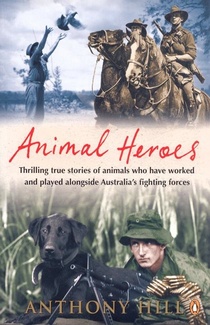
‘But that story has already been told,’ he said. ‘The authorities destroyed Horrie at the end of the war.’ But his friend replied, ‘I mean you should say what really happened.’ And breaking the silence of 60 years she whispered a whole new secret ending to Horrie’s ‘tail.’
Realising that there are many other animals who have served with Australia’s fighting forces whose stories have yet to be told, Anthony put them together in this book. Some like Simpson’s Donkey are well known, but most are largely forgotten…
The gallant steeds of the Light Horse, only one of which came home … the brave carrier pigeons two of whom won Dickin Medals, equivalent to the VC for animals … the faithful tracker dogs who were left behind in Vietnam … the mules, mascots, pets, military dogs, and even the dolphins who worked alongside Australian Navy divers in Iraq … All are Animal Heroes with a place in history.
PRISONERS OF WAR
Anthony's next military book combined two themes: the experience of Australian prisoners-of-war in Malaya during the Second World War and, like Soldier Boy, with a particular focus on youth caught up in the horrors of conflict.
Unlike his previous books, The Story of Billy Young was not written with a younger readership in mind. Given the sensitive and sometimes horrific, nature of the story, together with sexual material that could not be ignored, it was Anthony's first historical novel written speficially for an adult audience.
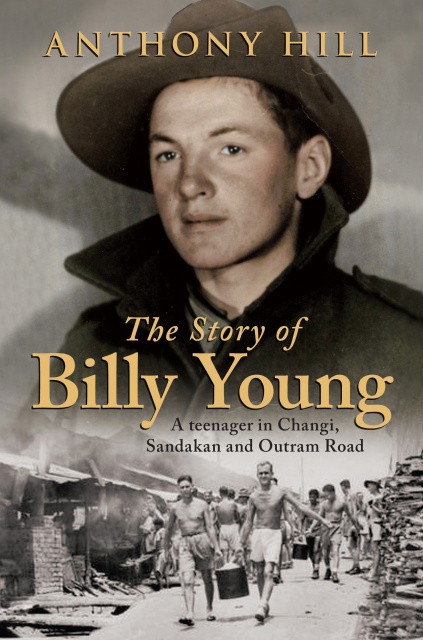
Billy Young was only 15 when he told the lie, enlisted in the army during 1941, mainly to get away from a homeless life, and was sent to Singapore. Captured when Singapore fell, he was sent a POW first to Changi then to the notorious Sandakan camp in north Borneo.
Escaping with a mate, Bill was soon captured and sent to the infamous Outram Road prison back in Singapore. He bewailed his fate sitting cross-legged all day in a tiny cell – but it was the saving of him. At the end of the war only six of the thousands of Australian POWs sent to Sandakan survived.
Returning home in 1945, thinking he was OK, Bill found that the ghosts of the past returned to haunt. His marriage failed, life seemed worthless until he taught himself to paint, to write, to face the ghosts with his art and to express the emotions and experiences of returned POWs, so many of of whom were unable to speak about them to anyone.
Anthony first heard about Billy from a relative at a market stall. Bill made himself and his art available for the biographical novel, on the understanding Anthony would try to make his story a national one. When Billy died at the age of 96 in 2022, the bargain had been fulflled on both sides: the book became a best-seller, and Billy's story was known from coast to coast.
RETURNED SOLDIERS
Anthony's last military novel was For Love of Country, a long biographical narrative tracing two generations of the soldier-settler Eddison family from the 1870s until the 1950s.
Written in response to a request for a work to celebrate the centenary of the Armistice, the book follows the experience of English farmer Walter Eddison in the WWI, and that of his three sons, Tom, Jack and Keith in the WWII.
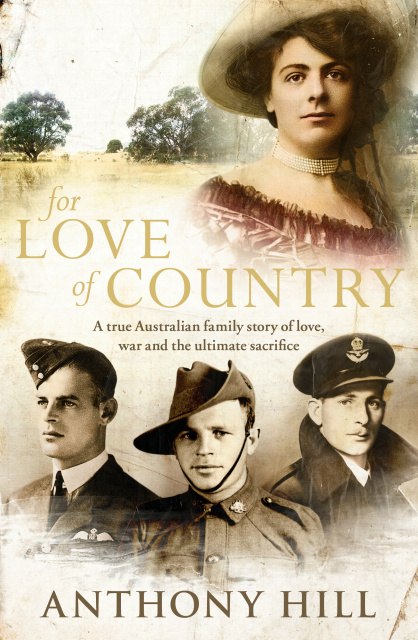 Walter was in Australia looking for land when the Gret War broke out in 1914. He joined the Light Horse, served at Gallipoli, later transferring to the infantry and went to France. He was promoted Captain, but was gassed – though not too severely – in June 1918. Walter was in Australia looking for land when the Gret War broke out in 1914. He joined the Light Horse, served at Gallipoli, later transferring to the infantry and went to France. He was promoted Captain, but was gassed – though not too severely – in June 1918.
At war's end the family migrated to Australia, took up a block in the Canberra district under the Soldier Settlement Scheme. The second part of the book follows their fortunes through through good times to Depression, and the family's growth to six children alongside the early development of the national capital, until the outbreak of the Second World War.
The last part of the book concerns the fate of the three Eddison sons who went to war: Tom, serving with the Royal Air Force bomber command flying raids over Germany; Keith, a serving pilot with the Royal Australian Air Force in New Guinea; and Jack, a soldier with the AIF in Malaya, captured and a POW after the fall of Singapore to Japan.
The story ultimately ends in tragedy, for none of the three sons returned from the conflict. This moving family history, encapsulates, I think, much of the courage, endurance and sacrifice of these two generations who suffered world war For Love of Country.
It was written with the close cooperation of members of the Eddison family, especially the last surviving daughter, the late Pam Yonge, to whom I remain eternally grateful for opening the family archive to me.
|